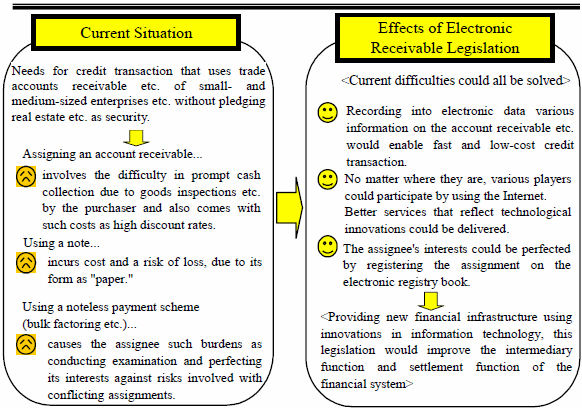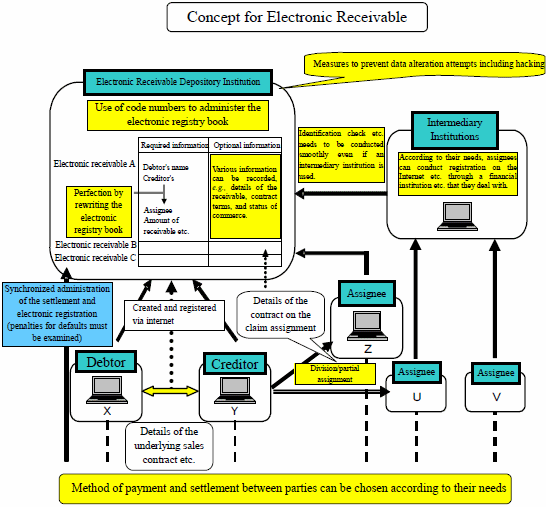| |
| In accordance with decisions by the IT Strategy Headquarters, including the one on the ''IT Policy Package'', the ''Working Group on Information Technology Innovations and Financial System'' (Chair: Professor Shuya Nomura, Chuo Law School) held a series of eight sessions, starting from April of this year, and deliberated on the issue of electronic receivable legislation from a financial system perspective. This is a part of financial infrastructure improvements through the strategic utilization of IT, which is one of the measures listed in the ''Program for Further Financial Reform''. As a resume of the deliberations, ''Summary of Discussions on Electronic Receivable Legislation from a Financial System Perspective'' (hereinafter referred to as ''Discussion Summary'') was released to the public on July 6, in the form of a memorandum issued in the Chair's name. |
1. |
Overview of ''Discussion Summary'' |
 |
|
In the ''Discussion Summary'', an electronic receivable is characterized as ''a new type of receivable that is different from either a nominative claim or a claim on a note, and that is created and assigned electronically and independently of underlying agreements such as a sales contract''. Electronic receivable is considered to be not only an across-the-board solution to issues raised in assigning the nominative claim or in using notes, but also a new financial infrastructure that could benefit from outcomes of future innovations in information technology, enabling a wide range of commercial information etc. to be utilized in financial services. This new framework can contribute to further development of financial intermediation function and settlement function in Japanese financial system. More specifically, the following effects are anticipated:
|
| |
Effects Expected from Electronic
Receivable Legislation on the Financial System |
|
 |
|
As shown in the chart below, the ''Discussion Summary'' specified four basic aspects, i.e., ''flexibility'', ''simplicity,'' ''growth'' and ''reliability,'' that would be required on the part of the financial system for electronic receivable legislation to deliver the effects expected. Also, the ''Discussion Summary'' sorted out issues relevant to a concrete shape of electronic receivable legislation.
|
|
 |
|
 |
| Electronic receivable legislation is expected to improve
financial intermediation function and settlement function through the following
effects: |
 |
|
|
 |
|
 |
|
 |
|
 |
2. |
Future Actions |
 |
|
Relevant ministries and organizations etc. will proceed with specific deliberations from a perspective of basic legislation etc. with a view to establishing the ''Electronic Receivable Law'' (name tentative). Financial Services Agency hopes that the ''Basic Aspects'' and the respective issues etc., which are presented in the ''Discussion Summarization,'' will be given appropriate consideration. Also, we are, at the same time, committed to taking appropriate actions, in response to the progress of deliberations in the future from a perspective of the financial system and practice. |
|
 |







